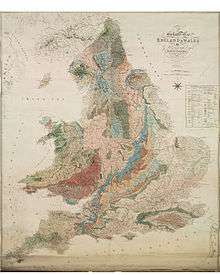1819 in science
| |||
|---|---|---|---|
|
The year 1819 in science and technology involved some significant events, listed below.
Astronomy and space science
- Johann Franz Encke computes the orbit of Comet Encke, identifying it as periodic.
- July 1 – Johann Georg Tralles discovers the Great Comet of 1819, (C/1819 N1). It was the first comet analyzed using polarimetry, by François Arago.
Exploration
- February 19 – Captain William Smith in British merchant brig Williams sights Williams Point, the northeast extremity of Livingston Island in the South Shetlands, the first land discovered south of latitude 60° S.
- October 15 – Desolation Island in the South Shetland Islands of the Antarctic is discovered by Captain William Smith in the Williams.
- A British Arctic expedition under William Edward Parry comprising HMS Hecla and HMS Griper reaches longitude 112°51' W in the Northwest Passage, the furthest west which will be attained by any single-season voyage for 150 years.[1]
Geology
- The Geological Society publishes a Geological Map of England & Wales by G. B. Greenough to rival William Smith's famous geological map.
 Geological Map of England & Wales by G.B Greenough, published by the Geological Society, 1819
Geological Map of England & Wales by G.B Greenough, published by the Geological Society, 1819
Medicine
- August – René Laennec publishes De l’Auscultation Médiate ou Traité du Diagnostic des Maladies des Poumons et du Coeur in Paris, describing his invention of the stethoscope.
- English physician John Bostock publishes the first account of allergic rhinitis (in himself).[2][3][4]
Technology
- May 22 – SS Savannah leaves port at Savannah, Georgia on a voyage to become the first steamship to cross the Atlantic Ocean, although only a fraction of the trip is made under steam. The ship arrives at Liverpool, England, on June 20.
- Invention of the M1819 breech-loading flintlock using interchangeable parts by Captain John H. Hall of Harpers Ferry Armory in the United States.
Institutions
- Cambridge Philosophical Society founded as a scientific society at the University of Cambridge in England.
Awards
- Copley Medal: Not awarded
Births
- May 3 (O.S. April 21) – Nikolai Annenkov (died 1889), botanist.
- June 5 – John Couch Adams (died 1892), mathematician and astronomer.
- August 13 – George Gabriel Stokes (died 1903), mathematician and physicist.
- September 18 – Léon Foucault (died 1868), physicist.
- September 23 – Hippolyte Fizeau (died 1896), physicist.
Deaths
- January – Elsa Beata Bunge, Swedish botanist (born 1734)
- August 19 – James Watt (born 1736), British inventor, mechanical engineer and mathematician.
- November 22 – John Stackhouse (born 1742), English botanist.
References
- ↑ Journal of a Voyage to Discover a North-west Passage. 1821.
- ↑ Bostock, John. "Case of a Periodical Affection of the Eyes and Chest", presented to Medical and Chirurgical Society of London.
- ↑ "The History of Allergy". Auckland Allergy Clinic. December 2001. Retrieved 2014-07-03.
- ↑ Parkinson, Justin (2014-07-01). "John Bostock: The man who 'discovered' hay fever". Retrieved 2014-07-03.
This article is issued from Wikipedia - version of the 6/1/2016. The text is available under the Creative Commons Attribution/Share Alike but additional terms may apply for the media files.